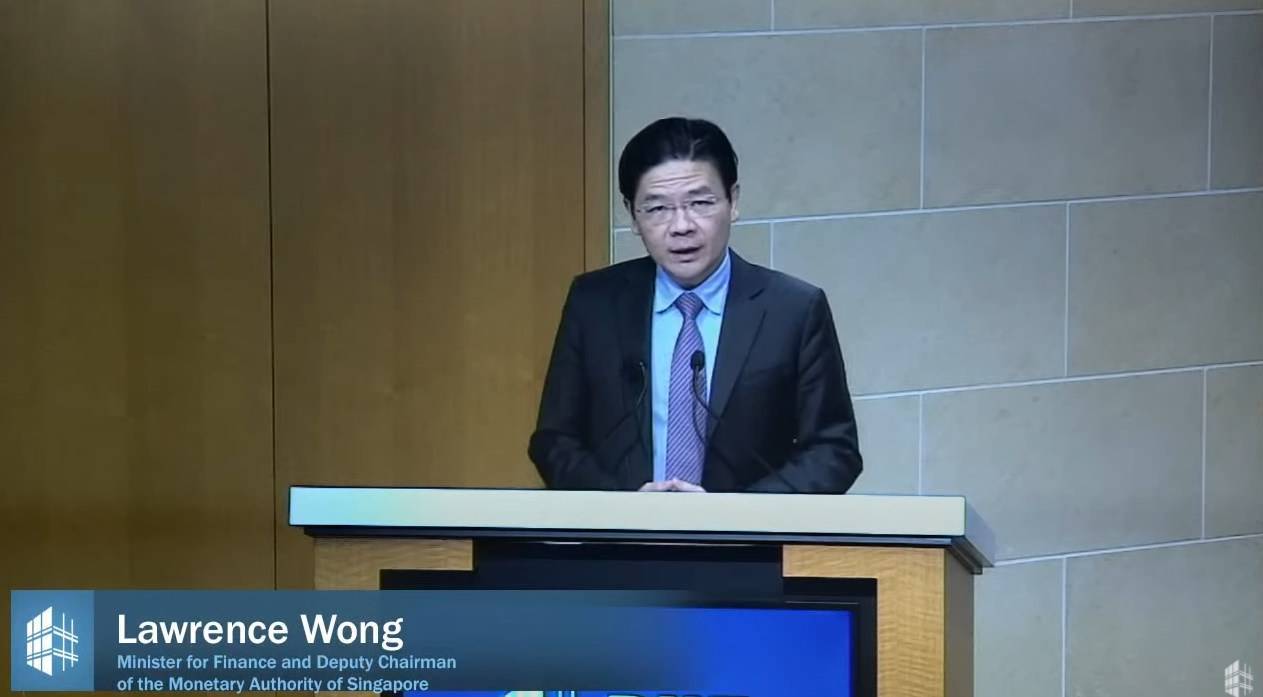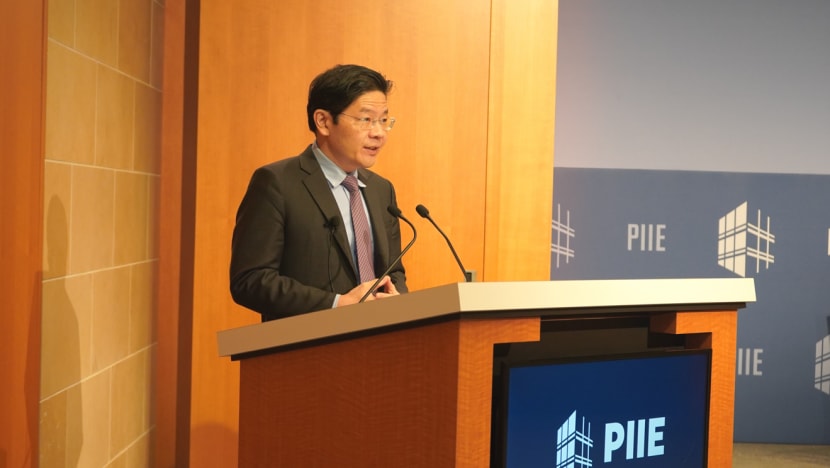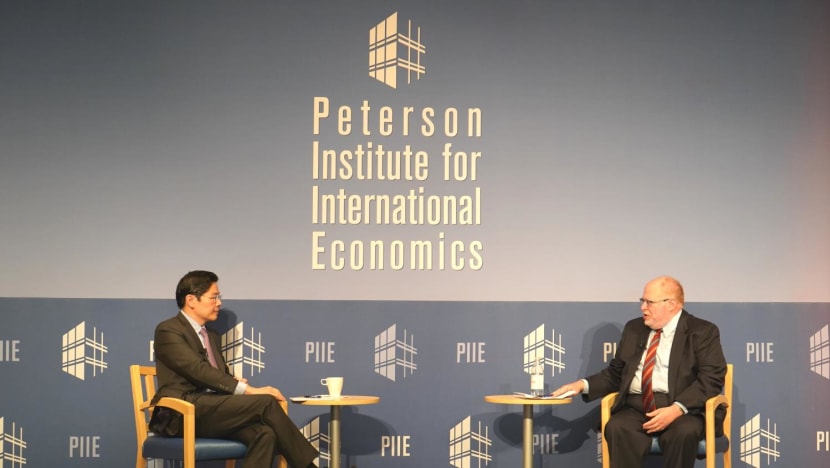【文/觀察者網 李煥宇】據新加坡《聯合早報》4月19日報道,已確定將出任新加坡下一任總理的黃循財在他的首個出訪行程中提出,將中國排除在現有國際體係之外,隻會令中國發展出以自身規則為基礎的一套平行體係。
本周一,新加坡財政部長黃循財開啟了他被確立為第四代領導班子領軍人後的首個出訪行程——美國智庫彼得森國際經濟研究所(PIIE)2022年宏觀周活動。他在致辭後的對話環節中提出,中國的增長趨勢不可阻擋,嚐試圍堵中國崛起不僅十分困難也不會有效,而且隻會讓中國更下定決心自力更生,開發本土科技並自行設立另一套國際規則。
他重申,中美關係是世界上最重要的雙邊關係,各國都希望雙方能繼續交流,找出在共同關注的議題上合作的方法。

黃循財講話現場 視頻截圖
黃循財稱:“我不知道我們最終是不是要生活在這樣的一個世界,這將是個非常不一樣的世界,而且對於每個人包括美國來說,都是高度不穩定的......事實是,中國會有自身的發展,美國沒有能力讓中國變得更像美國,但就算彼此存在差異,美國和中國都有共同關注的議題,包括如氣候變化等全球議題、應對大流行,甚至是核不擴散。”他相信,若能找出中美雙方能繼續競爭,卻又能相互依存,在開放的框架裏合作尋求互惠互利,整個世界都會更安全更美好。
黃循財還指出,如果當初美國沒有退出,《跨太平洋夥伴關係協定》(TPP)得以延續固然很好,但如今已有《跨太平洋夥伴全麵進展協定》(CPTPP),中國也提出了申請加入。該組織將通過適當的程序來處理中國的申請。除此之外,本區域內還有亞太經濟合作組織(APEC)、東亞峰會(East Asia Summit),以及拜登政府最近提出的“印太經濟框架”(Indo-Pacific Economic Framework),黃循財對此表示歡迎和支持。他說:“我們希望打造一個開放和包容的框架,讓所有大國能參與亞洲和亞太的事務。”
除了中美議題,黃循財還對發達經濟體的債務狀況表示擔憂。
近兩年,為了應對新冠大流行所帶來的經濟衝擊,世界多國政府絞盡腦汁擴大財政支出。但黃循財提醒,政府不可能一直擴大財政政策。在製定政策時,政府須確保公共支出是可持續的。
“不幸的是,許多發達經濟體的記錄並不樂觀,債務一直上升……我不確定這能持續多久。這不是免費的午餐。最終必須有人為此付出代價。”
“大國有更多的自由度。美國擁有一個大陸規模的經濟和全球儲備貨幣,就比新加坡擁有更多的自由度,但仍然會有極限。在某個時間點,我認為各國將不得不找到方法來縮減支出,並確保能重建財政空間以應對未來的衝擊。”
“不幸的是,許多發達經濟體的記錄並不樂觀,債務一直上升……我不確定這能持續多久。這不是免費的午餐。最終必須有人為此付出代價。”
“大國有更多的自由度。美國擁有一個大陸規模的經濟和全球儲備貨幣,就比新加坡擁有更多的自由度,但仍然會有極限。在某個時間點,我認為各國將不得不找到方法來縮減支出,並確保能重建財政空間以應對未來的衝擊。”
他婉轉指出,當舉債達到一個限度,任何政府都可能失去債務償還能力的信譽。雖然目前市場對中央銀行的公信力仍有一定信心,但這樣的信譽是各個央行多年來確保通脹能保持穩定,所建立起來的,央行不應該視之為理所當然,特別是發達經濟體的中央銀行必須展示果斷和決心,以解決目前通脹持續升溫的問題。

黃循財講話現場 圖片來源:聯合早報
黃循財還稱,各國必須重新定義財政政策,更新社會契約。為應對全球經濟麵臨的增長、包容和可持續發展三大結構性挑戰,國家與政府財政支出功能必須重新定位到為社會提供公共產品和建設長期集體能力上。
他說,各國之間和各國國內的貧富差距情況正在加劇。多數國家的代際流動性也減弱,社會階層越來越固化。疲弱和不平均的收入增長、高度的不平等和社會流動性的缺乏都造成嚴重風險。
“人們如果認為自己成功的概率不大,無論怎麽努力都無法躋身社會上層,下一代不會過得更好,社會穩定將受到影響,一切就會開始分崩瓦解。”
“人們如果認為自己成功的概率不大,無論怎麽努力都無法躋身社會上層,下一代不會過得更好,社會穩定將受到影響,一切就會開始分崩瓦解。”
在黃循財看來,各國必須在解決急迫問題和打造共同能力支撐長遠發展之間找到正確的平衡。國家應發揮更積極、有意義的角色,以達到重要的長期目標,包括提高生產力、應對不平等、重新啟動社會流動性,及催化綠色經濟。
黃循財是現任新加坡財政部長。4月14日,他財獲得內閣成員絕大多數的支持,正式推舉為第四代團隊領導。16日,新加坡總理李顯龍在總統府召開發布會時宣布,下一次大選將最遲在2025年11月舉行,屆時如果執政黨人民行動黨再次贏得大選,就由黃循財擔任總理。




 Minister for Finance Lawrence Wong at the Peterson Institute for International Economics Macro Week 2022 on Monday, Apr 18, 2022. (Photo: Ministry of Finance)
Minister for Finance Lawrence Wong at the Peterson Institute for International Economics Macro Week 2022 on Monday, Apr 18, 2022. (Photo: Ministry of Finance)




